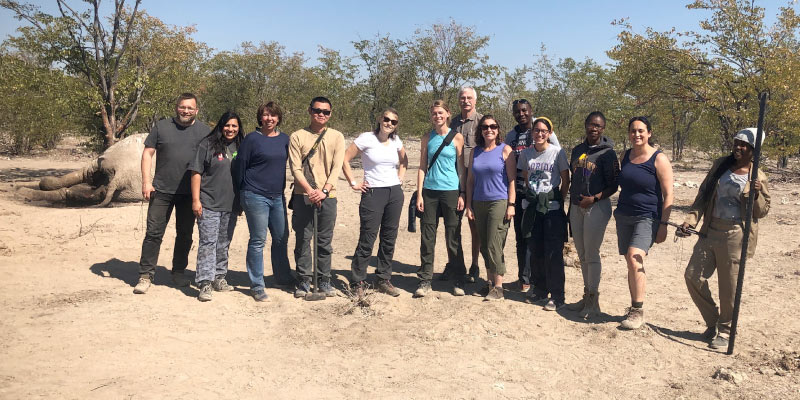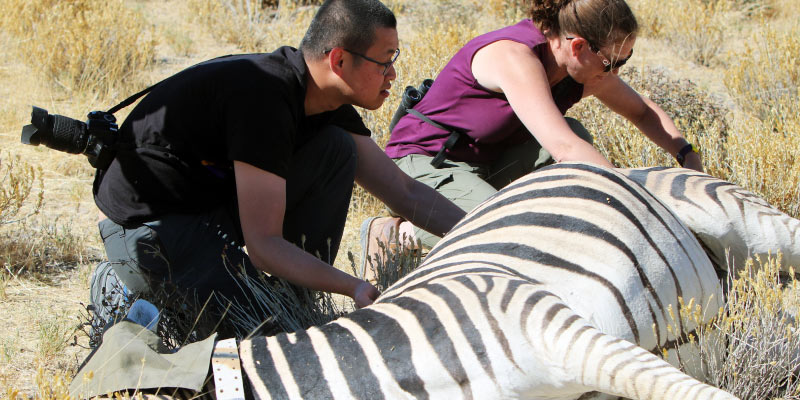
Understanding and improving the mitigation and management of pathogens shared among wildlife, livestock, and humans, is the inspiration for Nelson Institute affiliate Wendy Turner’s research. As a research biologist at the Wisconsin Cooperative Wildlife Research Unit (WCWRU) in the Department of Forest and Wildlife Ecology at the University of Wisconsin-Madison Turner works to enhance graduate education, while facilitating research and technical assistance with cooperative partners. She is also the primary investigator and lead of a research group working to understand wildlife disease ecology.
“An overarching theme of my research is how consumer-resource interactions and environmental variation frame host-parasite dynamics and parasite life history traits,” Turner shared. “My research focuses on wildlife parasites that transmit via a dormant phase or a life stage in the off-host environment.”

Turner shared that her current research is focused on three main wildlife disease systems. In particular, she is focusing on anthrax in herbivorous mammals in Namibia and South Africa, white-nose syndrome in northern long-eared bats on Long Island, Martha’s Vineyard, and Nantucket, and chronic wasting disease in white-tailed deer in the Midwest.
“Many pathogens are shared among wildlife, livestock, and humans, making the study of wildlife disease important to predict, manage and mitigate disease impacts on wildlife populations and on human health and livelihoods,” Turner said. “Yet, there is much that remains poorly understood about how even common diseases are transmitted, and how variation in transmission affects host-pathogen interactions at ecological and evolutionary scales.”
To gain a better understanding of these interactions and transmission pathways, Turner uses a disease triangle method of study. This incorporates studying three areas including how variation in hosts, pathogens, and the environment modulate host-pathogen contact, disease transmission, and ultimately disease outbreaks in host populations or communities.
By studying the hosts, pathogens, and the environment, Turner is learning more about disease transmission, which applies to diseases like those she’s studying, as well as other diseases like COVID-19.
“My interdisciplinary, field-centered approach integrates novel observational data collected at field sites by my research group and collaborators, natural experiments, statistical and mathematical modeling, laboratory work in microbiology, molecular biology, and parasitology, and draws upon related disciplines such as immunology and physiology,” Turner shared.
Prior to coming to UW–Madison in late 2020, Turner conducted similar research at the University of Albany, University of Oslo, Norway, and the University of California Berkeley. Turner’s education also took her around the world, receiving a bachelor’s in biology from Cornell University in New York, a master’s degree from the University of the Witwatersrand, South Africa, and a PhD from the University of California Berkeley.
“Wendy brings extensive expertise in wildlife disease ecology to our campus community” said Sean Schoville, the current chair of Wisconsin Ecology and UW–Madison associate professor of entomology. “The scope of her international research, and research here in the Midwest and U.S. more broadly, strengthens campus efforts to understand interactions among wildlife health, environment, and human health, and to address these issues with better public policy.”
Turner brings years of unique research and experiences to the Nelson Institute and will be sharing her knowledge as a part of her new role with the Nelson Institute Center for Ecology and the Environment (CEE) executive committee. The committee supports and guides CEE, which includes 23 different ecology-related academic units on campus. Executive members help organize events while also representing and advocating for ecological research on behalf of the UW–Madison community. One of the primary events for CEE is its fall and spring symposium, which Turner is looking forward to working on in the future. The symposium includes early-career researchers, undergraduates, graduates, and postdoctoral researchers sharing their work and findings.
“I’m a relatively new member of the UW-Madison community, and COVID has made it difficult to get to know people across the campus,” shared Turner. “Co-organizing the fall 2022 symposium will be a great opportunity to meet more of the ecological community.”
The CEE Spring Symposium will take place May 2-3 at the H.F. DeLuca Forum at the Wisconsin Institute of Discovery.
Learn more about the Center for Ecology and the Environment and how you can support the program.